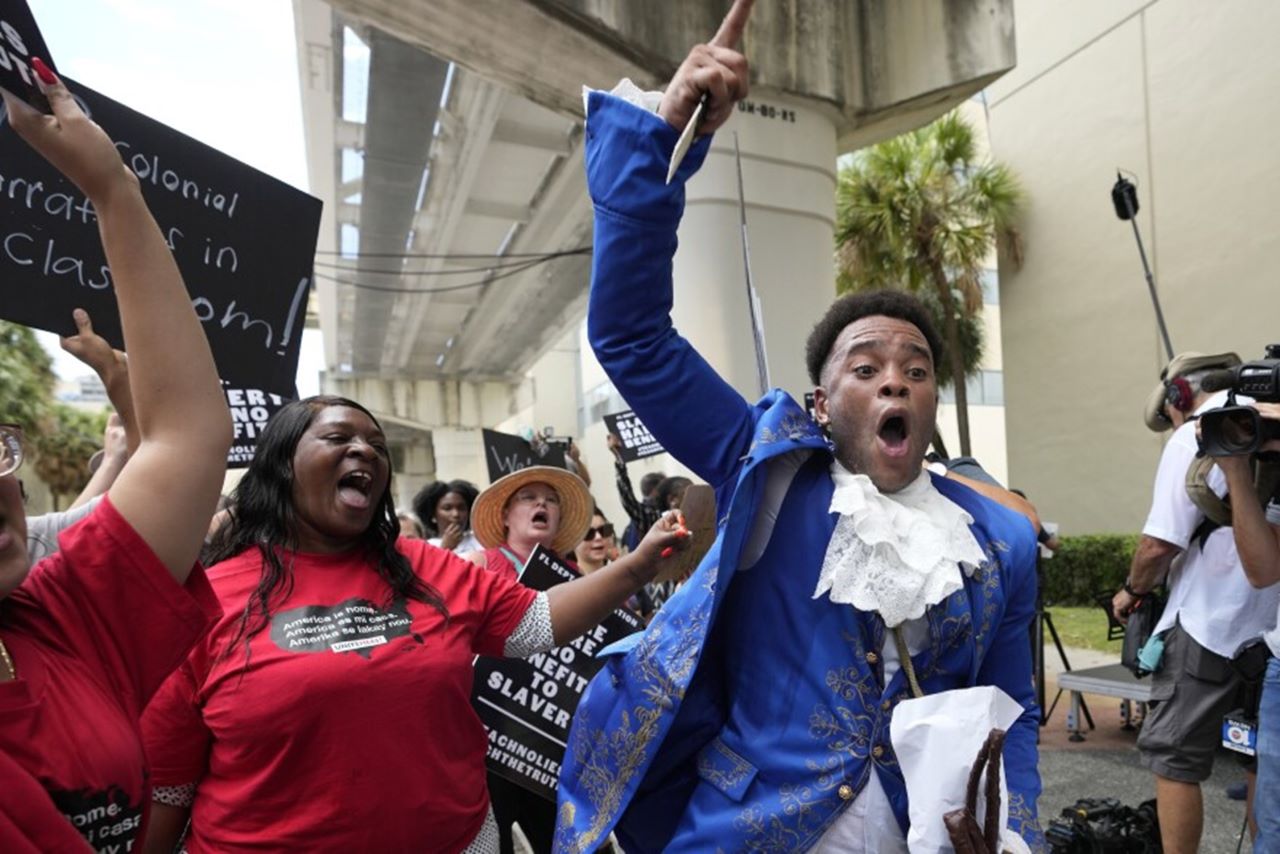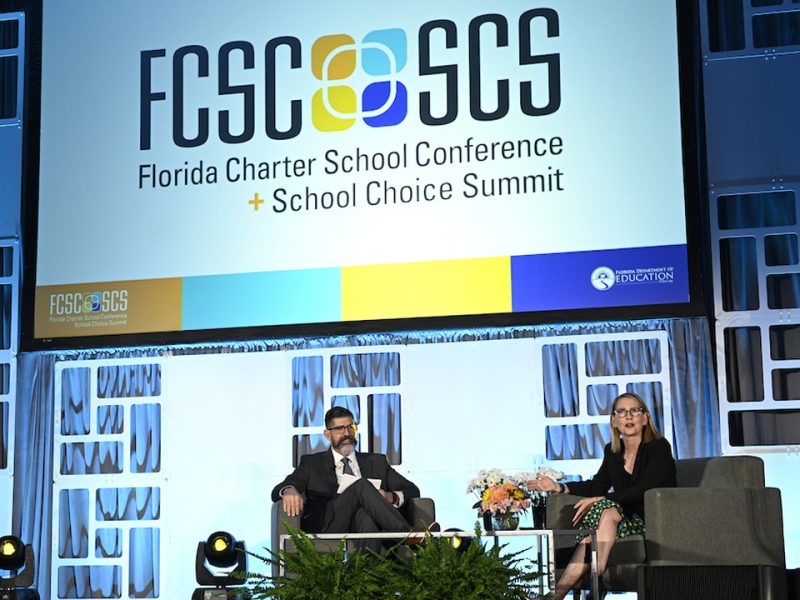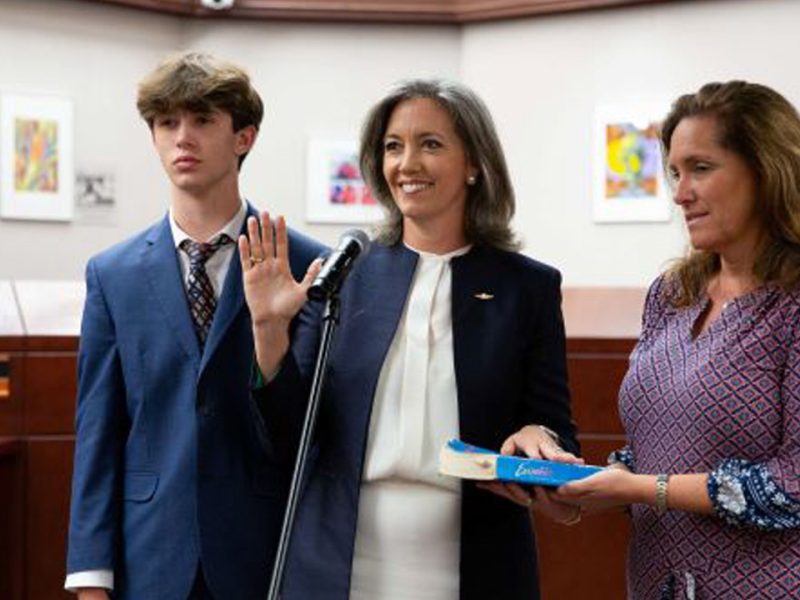
‘Teach no lies’: protestors march to Miami-Dade School Board to object to Black history standards
WLRN | By Kate Payne, Alexa Herrera | August 17, 2023
At least five dozen teachers, parents and activists marched to the headquarters of Miami-Dade County Public Schools on Wednesday, speaking out against Florida’s newly passed standards on teaching Black history.
Scores of demonstrators marched the mile from the historic Booker T. Washington High School in Miami’s Overtown neighborhood to the district’s administration building.
“Teach no lies! Teach no lies!” they chanted.
The protest came ahead of a school board meeting where new policies related to book challenges were approved — despite criticism that they could further empower ‘parents rights’ activists who have been targeting books that feature diversity.
Approved by the state Board of Education in July, the new African American history standards, among other things, require teachers to instruct middle school students that enslaved people “developed skills which, in some instances, could be applied for their personal benefit.”
“I’m just tired of my daughter being utilized as a political pawn to further other people’s propaganda,” said Gina Jeffries, whose daughter is a rising sixth grader.
Jeffries told WLRN she had her daughter pick a book from a so-called banned books list to read over the summer — instead of her school’s assigned reading.
“I’m just tired of my daughter being utilized as a political pawn to further other people’s propaganda,”
Parent Gina Jeffries
“If she receives a zero for not completing the assignment, I’m okay with that too and I accept that as a consequence,” Jeffries said.
Florida’s new African American history standards set a shared framework statewide for what students are expected to learn. What curriculum teachers use to help students meet those learning goals can be a district, school or classroom-level decision.
Parents, educators speak out against changes to Black history standards
Gustavo Rivera is a retired social studies teacher.
“Teachers are worried about what they can and can’t say in the classroom, and so they’re inhibited,” Rivero said.
The standards take effect this school year.
“These new state standards that DeSantis has come up with will not be tolerated in our schools. We will not let our children be taught that slaves benefited from their slavery. That’s a lie,” said march organizer Marvin Dunn, a professor emeritus of psychology at Florida International University.

People chat slogans during the “Teach No Lies” march to the School Board of Miami-Dade County to protest Florida’s new standards for teaching Black history, which have come under intense criticism for what they say about slavery, Wednesday, Aug. 16, 2023, in Miami. (AP Photo/Lynne Sladky)
Educators and community members carried the message into the Miami-Dade School Board’s formal meeting Wednesday as well — urging the district’s leaders to push back against the state’s new standards.
“This is an attempt to minimize the harsh realities and consequences of us chattel slavery,” said Natasha Esteves, a curriculum writer who does not work in the district.
“This is obviously offensive to our Black American brothers and sisters, whose own family history is tied to the learning,” Esteves told the board, “but it’s also offensive to everyone who cares about quality education — of teaching the truth, even difficult truths.”
Board approves changes to policies on book challenges
On Wednesday, the school board adopted new policies related to book challenges and empowering parents to be more involved in decisions on instructional materials.
The board voted 8-1 to create a new Educational Materials Advisory Committee, which is meant to “promote parent involvement” in the selection of textbooks and library materials.
The EMAC will be made up of 16 voting members, 9 of whom must be parents — one nominated by each of the board’s 9 members. The group will also include district officials, teachers, students and a PTA member.
Just one board member voted against the measure – Lucia Baez-Geller. She’s raised concerns that the committee — which is required to meet just three times a year — isn’t an effective way to gauge the input of parents and community members across the district.
She argued that platforming a select group of parents could be counterproductive and ineffective, at a time when “parental rights” advocates across the country are targeting books that feature diverse viewpoints or challenging issues.
“I am against this item. I thank staff for working so hard on this item but I do not support it,” Baez-Geller said Wednesday.
In an emotional speech, Baez-Geller announced at Wednesday’s meeting that she would not be running for reelection when her term ends in 2024. A former MDCPS teacher and the parent of a toddler, Baez-Geller has been an outspoken advocate, especially on LGBTQ issues.
According to the literacy and human rights organization PEN America, there were more than 2,500 instances of books being banned — affecting more than 1,600 titles — from July 2021 to June 2022. Texas and Florida were the states with the most bans, according to the organization’s 2022 report.
Many of the challenges have been brought by parents set on removing books that feature people of color and LGBTQ characters.
Additionally, the district updated its policies on challenging textbooks and library materials, in part to comply with changes in state law. The revisions come after MDCPS drew international attention when a school in Miami Lakes moved Amanda Gorman’s book “The Hill We Climb” out of the elementary school section of its library because a parent claimed the poem was ‘indoctrinating students’.
Under the updated policy, the school-level reviews of such challenges would be publicly noticed and a region director or region superintendent would attend the meetings, in addition to school-based staff.
Luis Atencio, who described himself as a former teacher, said he worries the policies undermine the expertise of certified educators, to the detriment of students.
“Generally, when we look for solutions, we seek expertise,” Atencio told the board. “As a former teacher, I love to see increased involvement and increased parent involvement.
“But at the same time, I cannot stand idly as this amendment gives individuals with essentially little to no expertise on the subject matter the capability to alter a more robust learning experience.”

The Associated Press contributed to this report.





